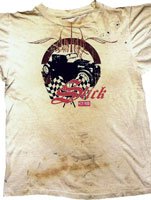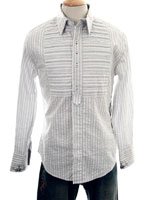English Laundry Makes Leap to Lifestyle Brand
Survival is the top priority for many fashion labels in this challenging economy. However, Los Angeles–based fashion company Defiance USA is making a gambit to expand. Instead of tightening belts, it is en route to becoming a lifestyle brand or offering products for almost every fashion category. The quest to become a lifestyle brand is a brass ring for many ambitious fashion labels on a growth spurt.
Defiance and its sister licensing company, Rock & Roll Religion, made their claim to developing lifestyle brands during the most recent MAGIC Marketplace. At Defiance’s 60-by-50-square-foot booth for its English Laundry label, it debuted nine new licenses for the popular shirting label.
Tailored tradition
English Laundry started business in 1999 as a manufacturer of intricately detailed men’s woven shirts. The label’s licenses aspire to clothe the entire man with suiting, headwear, neckwear, fragrance, luggage, and accessories such as cufflinks and watches. Defiance Chief Executive and Creative Director Christopher Wicks, who also serves as chief of Rock & Roll Religion, said he is in negotiations for licenses for eyewear and footwear.
“I moved from designer to lifestylist,” quipped the English-born Wicks.
The move was applauded by one of English Laundry’s retail partners, M.Fredric, a chain of boutiques based in Agoura Hills, Calif. It retails English Laundry woven shirts for $65 to $95. “They have always retailed well because of their styling and fair pricing,” said M.Fredric co-owner Fred Levine. “If they have any weakness at all, it is that they do not have a diverse-enough collection on the women’s side.”
Becoming a lifestyle brand is one way to grow and control risk for a fashion label, according to Fraser Ross, owner of Kitson, the high-profile Los Angeles boutique chain.
Much of the responsibility for the licensed line is assumed by the manufacturer, Ross said. Detailed contracts spell out what the licensed product will look like. A new product category will increase the size of a label’s offerings. “It’s the only way to grow a business sometimes,” Ross said.
Perhaps the only hazard for this method of growth is controlling quality, said Jason Bates, chief executive of Derelicte, a Los Angeles–based fashion showroom that sells lifestyle brands such as WeSC. “If it is well-executed, then it’s a good idea,” Bates said. “Managing it is the trick.”
New looks, new faces
Design inspirations linking English Laundry to its new categories such as suiting could help maintain its success. The line was inspired by tailored men’s shirts designed in 1960s England. Wicks updated the look with details such as embroidery and unique stitching. Suiting is similarly inspired by an English tradition, with unusual details such as pockets for cell phones and some contrast stitching. The suits ought to range in retail price from $500 to $700.
At MAGIC, English Laundry debuted a capsule collection called Scott Weiland for English Laundry, a suiting line designed with rock star Scott Weiland. Wicks also enlisted actor Charlie Sheen to be the public face for his classic men’s 1950s shirting collection, Da Vinci of California, and announced the partnership at MAGIC. At the same show, Wicks debuted Hot Rod The Clothing Collection, a T-shirt-based line co-branded with Hot Rod Magazine. Other lines under Wicks’ umbrella include Jimi Hendrix: The Experience and Fender: The Clothing Collection.
For increased growth, Wicks said, he was exploring retail opportunities such as opening stores in his native United Kingdom and selling his fashions in overseas regions. In the United States, his fashions have been carried by major retailers such as Nordstrom and Macy’s.
The past few years have been good for Wicks. In April 2008, he moved his operations into a 60,000-square-foot building south of downtown Los Angeles. The new space is double the size of his previous base of operations. The otherwise-ebullient executive, however, declined to state annual sales of his privately owned company.
The good times might continue to roll. Wicks said one strength of doing a lifestyle collection is when the popularity of one category fades, sales for another category might grow, which might cover a company throughout all seasons.
The strategy rings true with Kitson owner Ross, who said it is in a brand’s interests to constantly seek new customers. “I don’t know how long the life of a brand is,” Ross said. “It may be three years—unless it gets a new customer.”
























